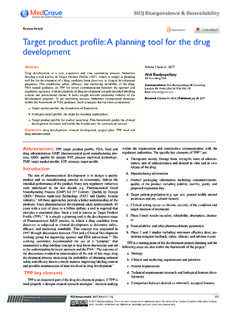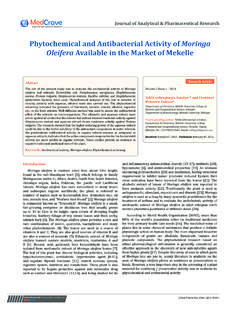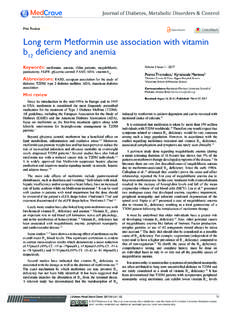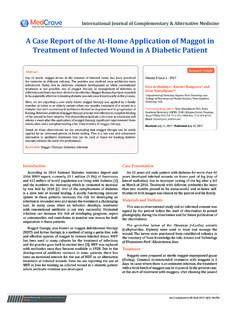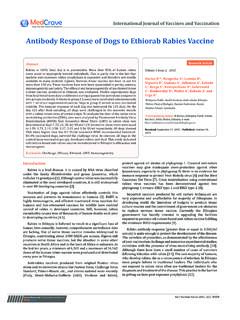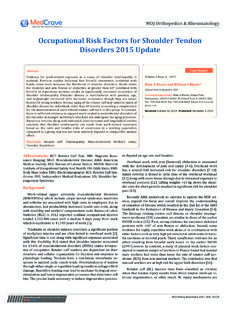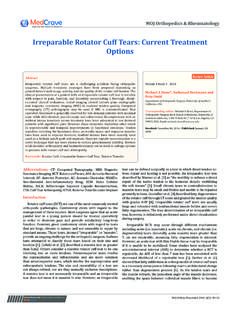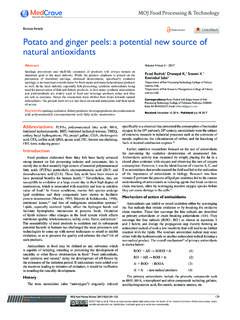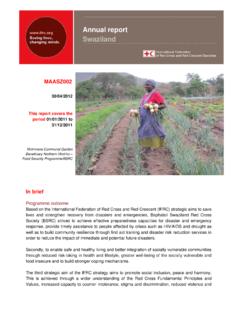Transcription of Perceptions of Swaziland’s youth towards farming: A case ...
1 Submit Manuscript | Bank of Swaziland1 Used a more extensive range of 16 to 39years old while2 reduced the range to all people between 12 and 24years. For the purpose of this study, the youth will be defined in terms of age, (15-35yrs). youth act as catalysts in agricultural development for most developing nations. There is recognition that for Africa to achieve food security, the youth must be regarded as critical agricultural players who need and deserve special attention. They are energetic, passionate and talented and this is thought that if the attributes are applied, they can catalyse agricultural development and solve problems facing the agricultural world Young people play a very important and active role in all family farms contributing to the overall ,5 Agriculture forms the backbone of swaziland s economy constituting a major part of the It is ranked second to manufacturing and employs over 70% of swaziland population, and a major contributor to rural household livelihood and The sector contributes 10% of the country s Gross Domestic product (GDP).
2 2 Of the total population ( ), only 137,000 people are economically active in agriculture youth forms the 43% of Swazi population but with less participation in economic activities including farming6 yet a big number of these youth are unemployed. Agribusiness is thought to absorb the youth to reduce the increasing unemployment rate but this is not the case as only 29% of the active youth population are engaged in Agriculture in swaziland . Like in most African countries, an increasing trend of ageing farming population in swaziland is causing Whereas8 note that young people are a very important resource required for the development of every nation especially for sustainability in agricultural productivity, in swaziland , youth have less interest in farming as source of youth Perceptions on agriculture differ amongst individual mainly due to the immediate environments in which they are exposed to Nyoni Among others, factors leading to poor youth participation in agriculture may include lack of access to farm credit/loans, limited government support.
3 And lack of information and communication In addition, the youth are faced with lack of readily available training programmes and education to further develop and support their skills, poor technology, and costly and scarce agro-inputs10,11 identified the following key youth challenges causing less participation in agriculture and these include: i) the absence of a functional farmer organisations, ii) difficulties in accessing loans, iii) absence of the land policy, iv) absence of comprehensive water resources development programme , v) low levels of knowledge and skills in agriculture, vi) general lack of basic skills in agri-business, vii) Ministry of Agriculture and Co-operative s (MoAC) structure Forest Res Eng Int J.
4 2017;1(3):83 8983 2017 Douglas et al. This is an open access article distributed under the terms of the Creative Commons Attribution License, which permits unrestricted use, distribution, and build upon your work of swaziland s youth towards farming : A case of manzini regionVolume 1 Issue 3 - 2017 Douglas K, Singh AS, Zvenyika KRDepartment of Agriculture Economics and Management, University of swaziland , SwazilandCorrespondence: Douglas Kibirige, Department of Agriculture Economics and Management, Faculty of Agriculture, University of swaziland , Luyengo M205, swaziland , Tel +268-78103616, Email Received: September 29, 2017 | Published: November 24, 2017 AbstractYoung people are very important resource required for the development of every nation especially for sustainability in agricultural production.
5 However, with low participation of youth in agricultural production, the future of the industry is questionable. Youths are distancing themselves away from farming in the face of government making efforts to attract them into the sector, creating employment while producing food for ever growing populations. The study was aimed at estimating the perception of youth towards farming , establishing the socio-economic characteristics that influence their perception towards farming as well as identifying challenges faced by youth in farming . Primary data was collected from Kwaluseni, Ntontozi and LamGabhi Tinkundla within Manzini Region using questionnaires and interviews.
6 A sample size of 78 was selected using multistage sampling technique. A likerted scale was used to establish youths positivity towards farming . Data was analyzed using SPSS and the multiple linear regression models were used to establish factors that influence perception of youth towards agriculture. Results of the study indicated that most respondents were single with an average age of 20years and do not own or have access to land for personal income generating projects. The majority do not have experience in farming and they are mainly getting their income from off-farm activities. The findings further revealed that socio-economic characteristics including gender, years of experience in farming , land ownership, occupation of guardian and the source of income are factors that significantly influence youth Perceptions towards farming .
7 The average scores indicated that youth had a negative perception towards farming with less interest caused by lack of knowledge and perceived low attractiveness of the industry. Therefore, the government and other stakeholders should encourage extensive use of modern technologies, provide infrastructure attractive to youth participation in agriculture, assist in arranging lucrative markets for agro-products produced by the youth , draft agribusiness programs in schools, and catalyse land policy reforms that are pro- youth to ease access to agricultural : environment, food security, youth , perception, attitudes, knowledge socio-economic, agricultureForestry Research and Engineering: International JournalResearch Article Open AccessPerceptions of swaziland s youth towards farming .
8 A case of manzini region84 Copyright: 2017 Douglas et : Douglas K, Singh AS, Zvenyika KR. Perceptions of swaziland s youth towards farming : A case of manzini region. Forest Res Eng Int J. 2017;1(3):83 89. DOI: responsive to the country s needs for technical support, viii) agricultural research is not demand driven, ix) too centralized, x) lack of appropriate policy, xi) inadequate capacity, and xii) ineffective delivery systems. youth also face challenges like inefficient extension service of the MoAC, poor marketing structure, high costs of imported inputs and low prices of produce, inadequate supply of breeding and feeder stock, effects of the HIV/AIDS pandemic result in reduced productivity due to a weakened and sick workforce.
9 Other challenges include strong beliefs in traditions and customs that are often in conflict with development and change concern, low education level, and low management capabilities of youth leaders in the rural There are no safety nets in place to assist young people when it comes to financial Other financial products as insurance for crops and livestock are virtually non-existent in most developing countries, and in cases where some form of insurance for farmers exists, it is limited. The unexploited youth agricultural labour and skills would be one of the reasons for reducing agricultural productivity in swaziland leading to increased dependence on food imports, hence a net food The country is increasingly loosing lots of money through increased imports.
10 High dependence on imports and reducing productivity due to the aging generation of farmers with less participation of the youth , this exposes the country further more into food insecurity and wide spreading poverty levels. swaziland government is trying to come up with strategies to change the attitudes and Perceptions of youth regarding The strategies included modern school agriculture in curriculums,13 designed to develop a positive attitude towards agriculture in Nierenberg D14 asserts that today s youth are tomorrow s family farmers; therefore it is of paramount importance to maintain their interest in farming as a profession for it is vital to food addition to agricultural school curium, the government of swaziland together with it development partners are making efforts to provide opportunities and infrastructural development for the youth and such efforts includes Ngwempisi Training Centre for youth and other existing infrastructure around the country available for the youth like Central Cooperative Union (CCU)
